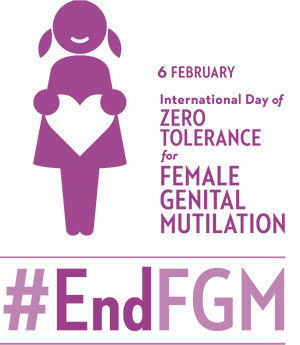#February6th: The International Day of Zero Tolerance for Female Genital Mutilation (#FGM): Celebrating Victories

February 6th marks the International Day of Zero Tolerance for Female Genital Mutilation (FGM), a day to raise awareness of FGM and work towards the elimination of this violent practice. FGM is considered a flagrant violation of millions of women rights to “health, security and physical integrity, their right to be free from torture and cruel, inhuman or degrading treatment, and their right to life when the procedure results in death”[1].
The UN estimates that between 100 million to 140 million girls and women alive today have undergone some form of FGM. If current trends continue, 15 million additional girls between ages 15 and 19 be subjected to it by 2030[2].
Along with the health issues caused by FGM, such as severe bleeding, cysts, infections, infertility and complications in childbirth, all of which increase the infant mortality rates. Moreover, FGM is a severe indictment to women’s sexual health and rights. Women have the right to the bodily integrity. Female sexuality is a major challenge. It is protected, controlled or operated in most socio-cultural systems. Genital mutilation is that control the sexual appetite and sexual relationships of women. They "close" girls to preserve their virginity, avoiding pregnancy, in brief they impose a code of conduct in order to find a husband. Women have a right to sexual pleasure. FGM reveals engrained inequality between the sexes and severe discrimination against women and girls in the communities it’s practiced. The struggle against FGM is central to the fight for #equality between women and men.
FGM falls under Culturally-Justified Violence Against Women (CVAW), defined and analysed here by Edna Aquino:
Legally binding human rights norms, especially the Convention to Eliminate All Forms of Discrimination Against Women (CEDAW)[1] explicitly state that no custom, tradition or religious consideration can be invoked to justify violence against women. Despite this, some of the most pernicious manifestations of gender-based violence are committed in the name of ‘culture’. Female infanticide, dowry deaths, marital rape, acid attacks, female genital mutilation/cutting, forced early marriage, and literal witch-hunting are examples of the most abhorrent forms of CVAW…The most extreme forms of CVAW are particularly widespread in impoverished and marginalized communities where illiteracy is high and lack of economic opportunities are rampant. Women and girls are deprived of their right to education and information and are strictly controlled by fathers, brothers, partners and husbands and even by women within their families and communities.
FGM is justified on religious bases, specially in Muslim communities where it sometimes passed as 'Sunnah' (following the Prophet's teachings or tradition). However, the practice is found in Muslim, and Christian, as well as in many communities of other religious systems, before the prevailing of both religions. For instance, in Sudan, the most severe type of FGM is called 'pharaonic' circumcision, which was practiced in ancient Egypt[3]. Many communities in West African also experienced the practice and some kept it even when they became Christian as in Burkina Faso where girls of both faiths are circumcised.
Nevertheless, the struggle against FGM has been going for decades with many victories as well as challenges, where about 24 countries in Africa, a continent rife with the practise, have banned FGM[4].
On the sight of the International Day of Zero Tolerance for FGM this year, Gambia banned FGM after decades of continues and courageous work of women such as our networker Dr. Touray and GAMCOTRAP advocating for women and girls’ autonomy to their bodily rights.
Today we celebrate all the breakthroughs – like this year’s GAMCOTRAP success- with regards to FGM: legislations and laws banning the practice, public awareness, survivors who are empowered and are able to lead the change in their communities. We also hope to see the day where women will be able to enjoy sole control over their own bodies, sexuality and fertility as their own choice, without fear.
More resources on FGM:
http://www.wluml.org/fr/taxonomy/term/260
http://www.wluml.org/search/apachesolr_search/FGM?filters=tid%3A110
http://www.wluml.org/search/apachesolr_search/FGM?filters=tid%3A125
http://www.wluml.org/search/apachesolr_search/FGM?filters=tid%3A104
http://www.violenceisnotourculture.org/resources/vaw/FGM
http://www.weldd.org/search/node/fgm
[1] http://www.un.org/en/events/femalegenitalmutilationday/
[2] http://www.un.org/en/events/femalegenitalmutilationday/
[3] http://www.global-alliance-fgm.org/en-gb/portal/aboutfgm/historicalnote.aspx
[4] http://www.unfpa.org/resources/female-genital-mutilation-fgm-frequently-asked-questions#banned_by_law


